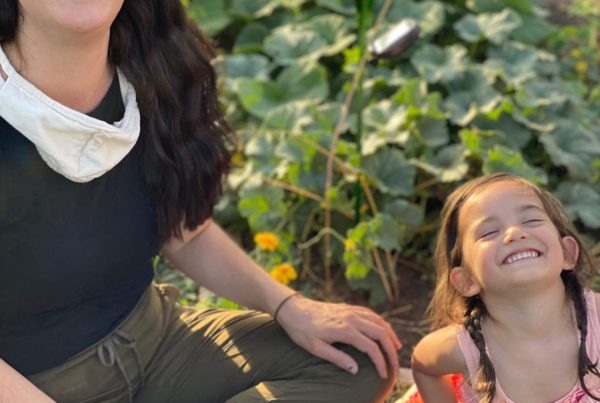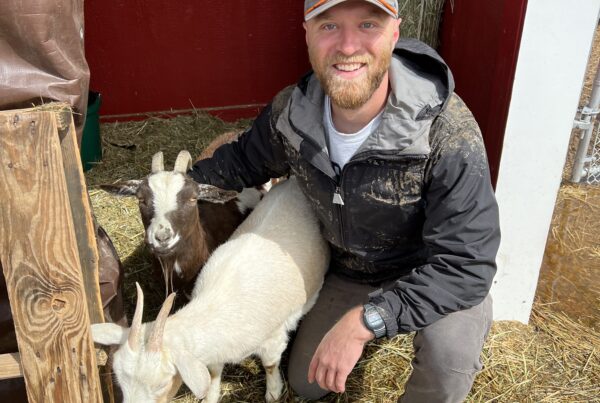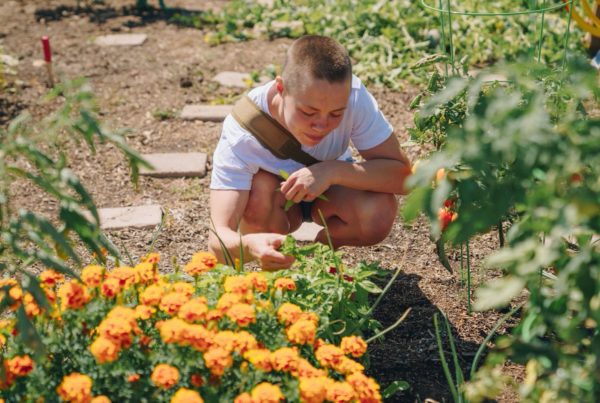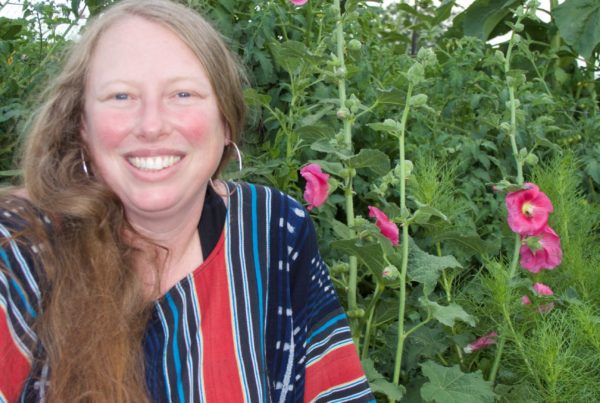#25: Meet Jolene, Palmer School community gardener
“I moved up to Denver from Arizona; I wasn’t much of a gardener in Arizona, because the climate is really challenging to garden in. I got involved with DUG because I saw the community gardens at the elementary schools, and my son was starting kindergarten at Park Hill. I put in a request to be at the garden there, so that was how I got initially connected– just seeing the gardens in the community and reading the signs attached to the different community gardens. It was actually interesting because as I was looking for school choice options and schools to send my son to, the ones I liked also often had the DUG gardens.
This year I’m growing lemon cucumbers, sugar snap, peas, butternut squash, golden yellow beets, and green string beans. I also have two types of tomatoes. One’s called pineapple tomato, which is yellow with a little bit of red in it–and the other, I’m not sure what it’s called, but it’s red with a little bit of purple in it.
I’m really proud because over the last two or three years I’ve started to harvest my own seeds and then regrow them. This year, all my sugar snap peas are grown from seeds that I collected last year. I also grew marigolds this year from seed, because last year with the pandemic, I spent probably like $30 for a flat of marigolds. They were just outrageous. You couldn’t find them anywhere, so I harvested the seeds and I grew all my own, which was enough for my garden while also giving away marigolds to around 10 other people, too.
I first started by saving butternut squash seeds and cucumber seeds because those were easy. Then last year, I added the sugar snap peas from seed. I attempted tomato seed that I had harvested using the method where you squeeze out their juice onto paper towels and then you plant the paper towels, but it didn’t work out this year. They didn’t take, so I adopted some tomato plants that someone was getting rid of–I did try training the tomato plants in buckets to see if they stay more contained and don’t go so crazy!
Over the years, I’ve also learned to save my own eggshells and my own coffee grounds to add those to the dirt. Saving your own seeds and growing your own seedlings feels very empowering. You don’t have to spend money or go get something from somewhere else–you can just generate it yourself year after year.
At Palmer, I’ve helped support another gardener who is in her 80s with a lot of health issues. I started to take food to her and then found a couple of other elderly people in my community to take some food to. One was in my apartment building and the other was an old professor who had retired from MSU. Then, I just started really going crazy because I didn’t like seeing any food wasted, so I would just harvest everything that people didn’t want!
I harvest a lot from the garden in Palmer; there are a lot of school plots that were beautifully-landscaped and planted with all sorts of things that came back year after year like rhubarb, kale and even asparagus, which grows like a weed. Because the school families weren’t coming and taking it, I started to take it to the Park Hill food bank. I now take produce there on Mondays and Wednesdays throughout the summer. From what I read and understand there’s definitely been an increased need.
I have experienced food insecurity over the course of my life, both growing up as a child, and then as a single parent–but I had access to resources, like the snap food stamp program, which actually lets you buy seeds or buy plants to garden with and create that self-sufficiency. I think maybe one year I used food stamps to purchase the things at Walmart to plant. For me, it’s about self-sufficiency and growing your own food, and how that feels to feed yourself and feed others through your efforts. That’s what drives me a lot.
I think it’s hard sometimes to connect with neighbors or people in the community because our sense of community is so spread out and not just where we live. I’ve learned so much from my fellow gardeners about what to do with my soil. I started growing dahlias, which are very temperamental and really get eaten by Japanese beetles. This is my first year using their tubers with their roots from last year to regrow them. That’s something that if I hadn’t known someone at the garden who was doing it, I probably never would have attempted it either.
For people that are just getting started, I would just say don’t be intimidated. It’s really easy. Dig a hole, throw some seeds in it, throw some water on it, and don’t be intimidated to start somewhere. For example, in my garden for the first couple years, I always planted too much stuff, and it got too crowded–everything was growing over each other. But you know, five or six years in, now I have this little grid system, and you can really clearly see where everything is and is supposed to be. You learn different techniques over the years. I encourage people to play around, too. If it doesn’t grow this year, just stick with it. Try it knowing you can’t fail because it’s not really failure. It’s just learning and the chance to grow something later on if it doesn’t work out the first time.
I think one of the greatest benefits for me is just the time I spend outside, working hard, getting dirty– it feeds my soul, and it improves my mood. I’ll spend five or six hours out in the sun and the heat, and just be so happy with what I have accomplished in the end. There’s a lot of mental health benefits to gardening and so I selfishly garden for that. Similar to giving food away, there’s a lot of intrinsic value. It feels good for me to know I’m feeding other people; there’s also a lot of pride in seeing that you grew something that a week ago was just an inch tall and now it’s got food on it.”







